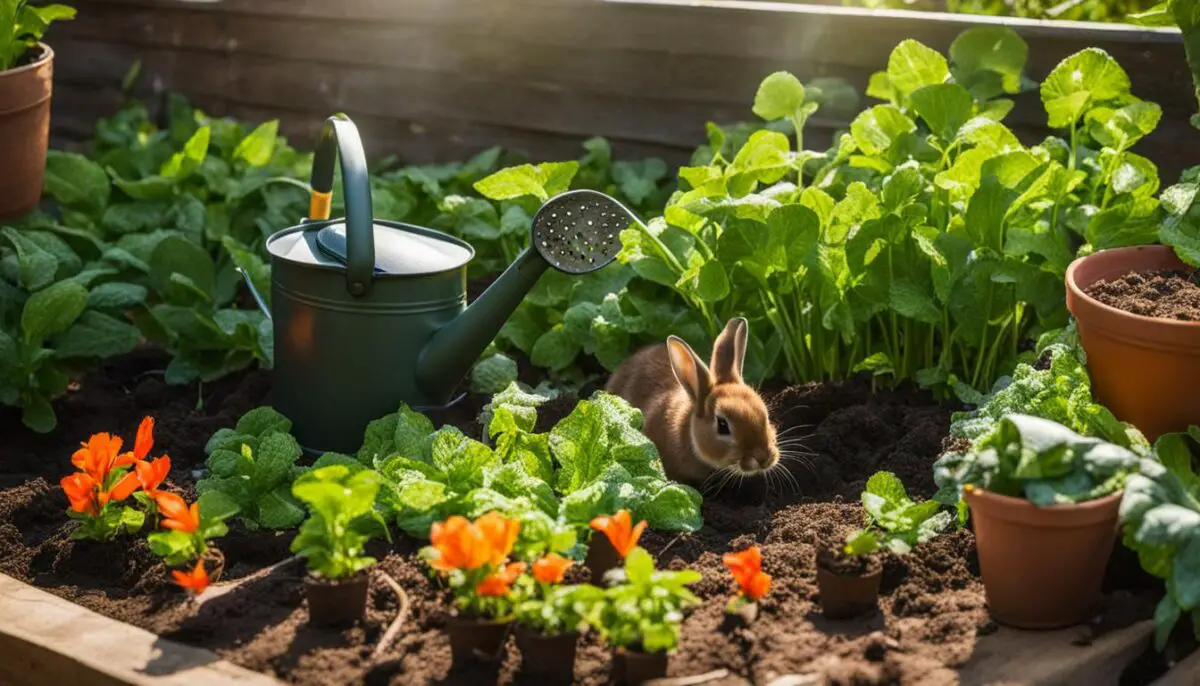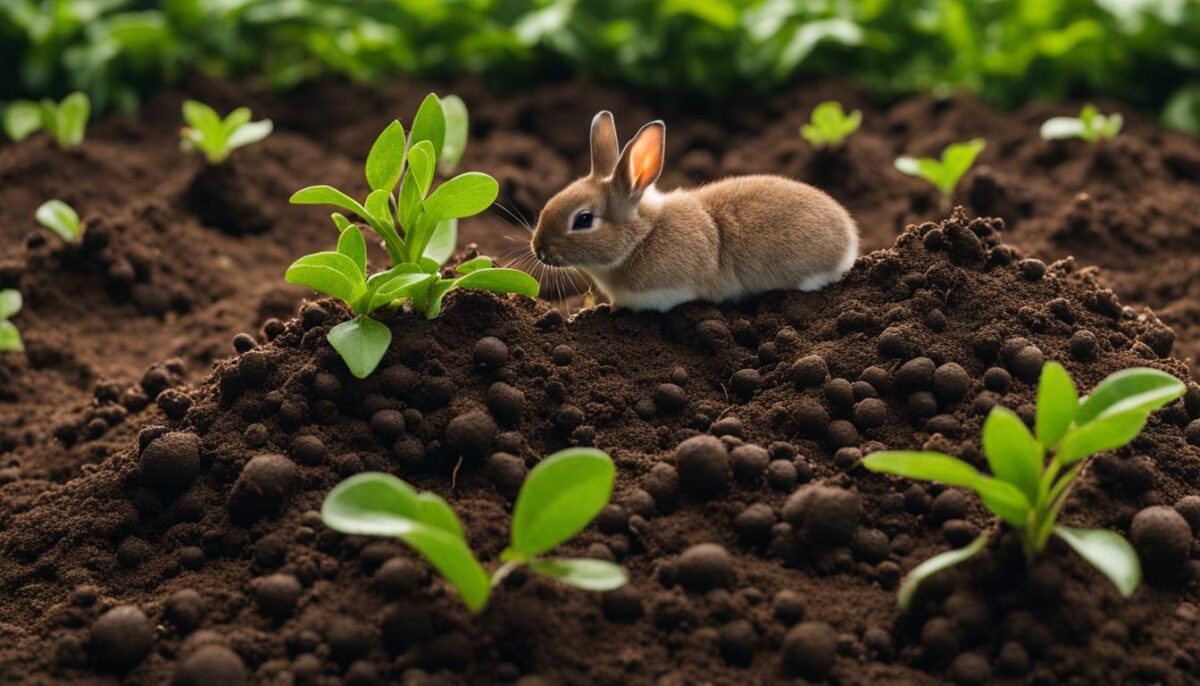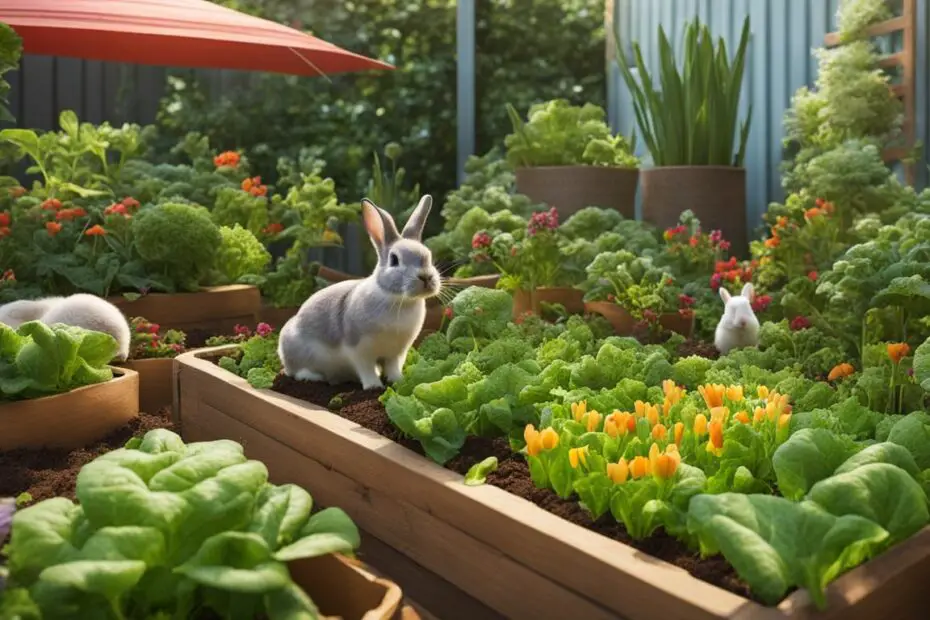If you’re a gardener or plant enthusiast, you may be surprised to learn that rabbit poop, or rabbit manure, is a highly beneficial and natural fertilizer. In fact, it’s considered one of the best organic fertilizers for your plants and gardens.
Rabbit manure is packed with essential nutrients like nitrogen, phosphorus, and potassium, as well as minerals and micronutrients. In fact, it’s four times more nutrient-rich than cow or horse manure and twice as rich as chicken manure! These nutrients promote strong green growth, support root and fruit development, and contribute to the overall health and quality of your plants.
One of the great advantages of rabbit manure is that it doesn’t need to be composted before use, unlike some other types of manure. This makes it convenient for gardeners who want a hassle-free fertilizer option.
Key Takeaways:
- Rabbit manure is a highly beneficial and natural fertilizer for plants and gardens.
- It contains essential nutrients like nitrogen, phosphorus, and potassium.
- Rabbit manure is more nutrient-rich compared to other types of manure.
- It can be used directly in the garden without the need for composting.
- Rabbit manure promotes strong green growth, root and fruit development, and overall plant health.
The Advantages of Rabbit Poop as Plant Food
Using rabbit droppings as garden fertilizer offers numerous advantages that make it an excellent choice for nourishing your plants. Whether you’re a seasoned gardener or just starting out, incorporating rabbit waste as a natural fertilizer can significantly improve the health and growth of your garden. Here are some key benefits of using rabbit poop as plant food:
- Safe and Convenient: Unlike some other manures, rabbit manure can be used directly in the garden without the need for composting. This makes it a convenient option for gardeners who want a hassle-free way of enriching their soil.
- Easy to Handle: Rabbit poop is not as smelly as other manures, making it easier to handle during application. This is especially beneficial if you have a small garden or prefer to work on your plants up close.
- Slow-Release of Nutrients: Rabbit droppings provide a slow-release of essential nutrients such as nitrogen, phosphorus, and potassium. This gradual release helps improve soil structure, adding stability and enhancing the growth of your plants.
- Promotes Plant Growth and Beauty: The nutrient-rich properties of rabbit poop make it an ideal plant food. The nitrogen content supports strong green growth, while phosphorus contributes to energy transformation and stress resistance. Potassium is crucial for fruit quality and disease reduction. By using rabbit waste as a natural fertilizer, you’ll enjoy healthier plants with vibrant flowers and bountiful fruits.
- Reduces Chemical Additives: Using rabbit waste as a natural fertilizer reduces the need for chemical additives that can harm soil life. By opting for organic alternatives like rabbit poop, you contribute to a more sustainable and environmentally-friendly gardening approach.
To visualize the advantages of using rabbit poop as plant food, refer to the table below:
| Advantage | Description |
|---|---|
| Safe and Convenient | Directly applicable in the garden without composting |
| Easy to Handle | Less smelly and easy to work with during application |
| Slow-Release of Nutrients | Provides a gradual release, improving soil structure |
| Promotes Plant Growth and Beauty | Supports strong growth, flowering, and fruiting |
| Reduces Chemical Additives | Minimizes the need for harmful chemical additives |

“Using rabbit manure in my garden has been a game-changer. It’s so easy to work with, and the results are incredible. My plants have never looked better!” – Jane, avid gardener
The Nutrient-Rich Properties of Rabbit Droppings
Rabbit droppings, also known as bunny berries, are highly valued for their nutrient-rich properties, making them an excellent choice for plant fertilization. These little pellets pack a powerful punch when it comes to providing essential nutrients for plant growth and overall soil health. Let’s explore why rabbit poop is good for plants and why it is considered a sustainable soil amendment.
The Power of Nutrients
Rabbit droppings are a rich source of essential nutrients that plants need to thrive. They contain high levels of nitrogen, phosphorus, and potassium, commonly known as NPK, which are vital for plant growth and development. Nitrogen promotes lush green growth, while phosphorus plays a crucial role in energy transformation and stress resistance. Potassium, on the other hand, contributes to fruit quality and helps reduce the risk of diseases in plants.
“Rabbit droppings are packed with essential nutrients, including nitrogen, phosphorus, potassium, and micronutrients.”
In addition to NPK, rabbit manure also contains a range of beneficial trace elements such as calcium, magnesium, boron, zinc, manganese, sulfur, copper, and cobalt. These micronutrients play key roles in supporting plant health, enhancing nutrient absorption, and improving overall growth.
Sustainable Soil Amendment
Using rabbit manure as a soil amendment is a sustainable choice for gardeners. Not only does it provide essential nutrients to plants, but it also improves the overall structure, drainage, and moisture retention of the soil. The organic matter in rabbit droppings enhances soil fertility and creates a nutrient-rich environment that fosters the growth of beneficial microorganisms.
Rabbit manure serves as a sustainable soil amendment, improving poor soil structure, drainage, and moisture retention. It creates a nutrient-rich environment for the growth of beneficial microorganisms.
The nutrient-rich properties of rabbit droppings make them an effective and eco-friendly alternative to synthetic fertilizers. By adding rabbit manure to the soil, gardeners can promote healthier plant growth while reducing their reliance on chemical additives that can harm soil life over time.
The Role of Microorganisms
One of the key benefits of using rabbit manure is its ability to support the growth and activity of beneficial microorganisms in the soil. These microorganisms break down organic matter, releasing nutrients in a form that plants can readily absorb. They also improve soil structure, allowing for better aeration and root development. As a result, plants have increased access to the essential nutrients they need to grow, leading to stronger, more vigorous growth and higher crop yields.
By harnessing the nutrient-rich properties of rabbit droppings, gardeners can create a sustainable and thriving ecosystem in their gardens. The natural balance of nutrients and microorganisms nurtured by rabbit manure contributes to healthier plants, increased soil fertility, and a bountiful harvest.
| Nutrient | Function |
|---|---|
| Nitrogen | Promotes strong green growth |
| Phosphorus | Aids in energy transformation and stress resistance |
| Potassium | Crucial for fruit quality and disease reduction |
| Calcium | Essential for cell wall development |
| Magnesium | Supports chlorophyll production and photosynthesis |
| Boron | Facilitates nutrient uptake and cell division |
| Zinc | Required for enzyme activity and hormone synthesis |
| Manganese | Activates enzymes involved in metabolic processes |
| Sulfur | Essential for protein synthesis and overall plant growth |
| Copper | Plays a role in enzyme activity and carbohydrate metabolism |
| Cobalt | Aids in nitrogen fixation by beneficial soil bacteria |
With its nutrient-rich composition and sustainable benefits, rabbit manure stands as a valuable resource for any gardener seeking to nourish plants and foster a healthy garden ecosystem.

Different Ways to Use Rabbit Manure
There are various ways to harness the power of rabbit manure as a natural fertilizer in your gardening endeavors. By utilizing this nutrient-rich resource, you can enrich your soil, promote plant growth, and cultivate a thriving garden. Here are some effective methods for utilizing rabbit poop as a garden fertilizer:
1. Direct Application as “Bunny Berries”
One straightforward and convenient way to use rabbit manure is by applying it directly to your garden in its pelleted form, often referred to as “bunny berries.” These dry and odorless pellets can be spread as topdressing, used as mulch, or worked into the soil. The nutrients in the rabbit manure will slowly release over time, providing continuous nourishment to your plants.
2. Composting for Nutrient-Rich Soil
Another option is to compost the rabbit manure to create nutrient-rich compost for your gardens, plants, and crops. Composting helps break down the organic matter, releasing nutrients and creating a balanced soil amendment. Incorporating composted rabbit manure will improve the soil structure, enhance moisture retention, and provide essential nutrients that promote healthy plant growth.
3. Creating Rabbit Compost Tea
Rabbit manure can also be used to make a concentrated liquid organic fertilizer called rabbit compost tea. To make this nutrient-rich tea, steep rabbit pellets in water for a period of time. The nutrients from the manure will dissolve into the water, creating a potent fertilizer that can be used to water your plants. This method provides a quick and efficient way to deliver essential nutrients directly to your plants’ roots.
4. Feeding Worms with Rabbit Manure
Rabbit manure serves as an excellent food source and bedding material for growing worms. These worms, commonly known as red wigglers or compost worms, thrive on organic materials such as rabbit poop. By establishing a worm composting system, you can further break down the manure into nutrient-rich worm castings, which can be used as a powerful organic fertilizer for your plants.
By leveraging these different methods, you can effectively utilize rabbit manure as a natural fertilizer to enhance your garden’s health and productivity. Whether you choose to apply it directly, compost it, create compost tea, or nourish your worms, the nutrient-rich properties of rabbit manure will contribute to vibrant and thriving plants.
Conclusion
Rabbit poop, also known as rabbit manure, is a remarkable and sustainable fertilizer that brings numerous benefits to gardens and plants. Its nutrient-rich composition, consisting of nitrogen, phosphorus, potassium, and essential micronutrients, plays a crucial role in supporting plant growth, flowering, and fruiting.
One of the significant advantages of using rabbit manure as fertilizer is its convenience. Unlike other organic fertilizers, rabbit poop can be directly applied to the garden without the need for composting. This makes it a time-saving and efficient option for gardeners.
Furthermore, rabbit manure improves soil structure, enhancing drainage and moisture retention. It creates a favorable environment for the proliferation of microorganisms that are essential for the overall health and vitality of the soil. By incorporating rabbit poop into their gardening routine, enthusiasts can promote healthier plants and reduce reliance on chemical additives.
In summary, using rabbit manure as fertilizer presents a win-win situation for gardeners. The nutrient-rich content of rabbit poop supports robust plant growth, while its convenient application method and soil-enhancing properties make it an excellent choice for sustainable gardening practices. So, reap the benefits of this natural treasure and watch your garden thrive!
FAQ
Is rabbit poop a good fertilizer for plants and gardens?
Yes, rabbit manure is a highly beneficial and natural fertilizer. It contains essential nutrients like nitrogen, phosphorus, and potassium, as well as minerals and micronutrients. Rabbit manure is four times more nutrient-rich than cow or horse manure and is twice as rich as chicken manure.
What are the advantages of using rabbit poop as plant food?
Rabbit manure offers several advantages as plant food. It is safe to use directly in the garden without the need for composting. The pellets can be applied as topdressing, mulch, or worked into the soil. Rabbit manure is not as smelly as other manures, making it easy to handle. It provides a slow-release of nutrients, improving soil structure and adding stability.
Why is rabbit poop good for plants?
Rabbit droppings are packed with essential nutrients, including nitrogen, phosphorus, potassium, and micronutrients. These nutrients support plant growth, flowering, and fruiting. Rabbit manure also contains beneficial trace elements such as calcium, magnesium, boron, zinc, manganese, sulfur, copper, and cobalt. Additionally, rabbit manure serves as a sustainable soil amendment, improving poor soil structure, drainage, and moisture retention.
What are the different ways to use rabbit manure?
There are various ways to use rabbit manure in gardening. One method is to use it directly as a natural fertilizer in its pelleted form, known as “bunny berries.” These dry and odorless pellets can be applied to the garden as topdressing, mulch, or worked into the soil. Rabbit manure can also be composted to create nutrient-rich compost for gardens, plants, and crops. Another option is to make rabbit compost tea, a concentrated liquid organic fertilizer. Additionally, rabbit manure can be used for growing worms, providing an excellent food source and bedding material.
Should I use rabbit manure as fertilizer?
Yes, using rabbit manure as fertilizer provides numerous benefits. Its nutrient-rich composition promotes healthier plants and a thriving garden. Rabbit manure is convenient to use directly in the garden, improves soil structure and drainage, and contributes to the overall health and quality of plants. Additionally, using rabbit manure reduces the need for chemical additives that can harm soil life.


